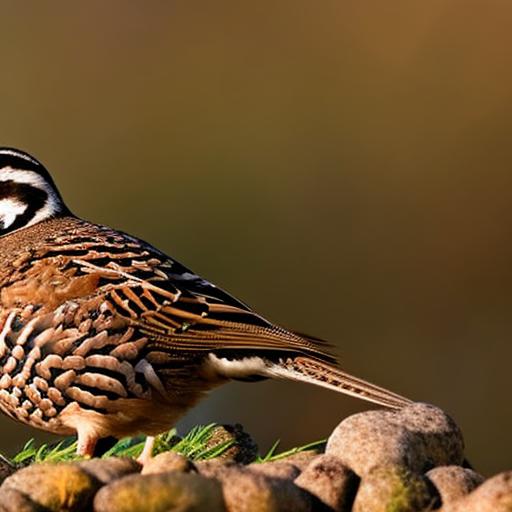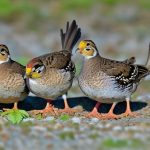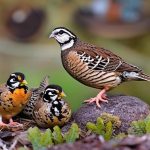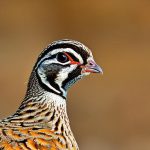When it comes to keeping quails indoors, it’s important to choose the right species that will thrive in an indoor environment. There are several species of quails that are well-suited for indoor keeping, including the Coturnix quail, also known as the Japanese quail. These quails are small, quiet, and easy to care for, making them an ideal choice for indoor environments. Another popular species for indoor keeping is the Bobwhite quail, which is known for its beautiful plumage and gentle nature. Both of these species are well-suited for indoor living and can thrive in a controlled environment with proper care and attention.
In addition to the Coturnix and Bobwhite quails, there are other species that can also be kept indoors, such as the Button quail and California quail. However, it’s important to research each species thoroughly to ensure that they are well-suited for indoor living and that you can provide the proper care and environment for them to thrive. By choosing the right quail species for indoor keeping, you can ensure that your quails will be happy and healthy in their indoor habitat.
Key Takeaways
- Choose a quail species that is well-suited for indoor keeping, such as Coturnix or Button quails, due to their small size and adaptability.
- Set up a suitable indoor quail habitat with proper bedding, nesting areas, and perches to mimic their natural environment.
- Provide proper nutrition and access to clean water for indoor quails, including a balanced diet of commercial quail feed and occasional treats.
- Maintain cleanliness and hygiene in the indoor quail environment by regularly cleaning the habitat and providing dust baths for the quails.
- Manage temperature and humidity levels in the indoor quail habitat to ensure a comfortable and healthy environment for the quails.
- Handle and socialize with indoor quails regularly to build trust and reduce stress, but avoid excessive handling to prevent unnecessary stress.
- Ensure the health and veterinary care of indoor quails by monitoring for signs of illness, providing regular check-ups, and seeking professional care when needed.
Setting Up a Suitable Indoor Quail Habitat
Setting up a suitable indoor habitat for quails is essential for their health and well-being. When creating an indoor habitat for quails, it’s important to consider their natural behaviors and needs. Quails are ground-dwelling birds that require space to move around, dust bathe, and nest. Therefore, it’s important to provide a spacious enclosure with plenty of room for them to roam and explore. A large cage or aviary with a solid floor is ideal for indoor quails, as it allows them to move freely and engage in natural behaviors.
In addition to providing ample space, it’s important to include suitable bedding material in the indoor habitat. Bedding material such as straw, hay, or wood shavings can provide a comfortable and clean surface for the quails to walk on and nest in. It’s also important to include hiding spots and perches in the indoor habitat to give the quails a sense of security and enrichment. By creating a suitable indoor habitat for quails, you can ensure that they have a comfortable and stimulating environment to live in.
Providing Proper Nutrition and Water for Indoor Quails
Proper nutrition and access to clean water are essential for the health and well-being of indoor quails. Quails require a balanced diet that includes a combination of commercial quail feed, fresh fruits and vegetables, and occasional treats such as mealworms or seeds. It’s important to provide a high-quality commercial quail feed that is specifically formulated for their nutritional needs. Additionally, fresh fruits and vegetables can be offered as supplemental treats to provide additional nutrients and enrichment for the quails.
In addition to a balanced diet, access to clean water is essential for indoor quails. Quails require a constant supply of fresh, clean water to stay hydrated and healthy. It’s important to provide water in a shallow dish or waterer that is easily accessible to the quails. The water should be changed regularly to ensure that it remains clean and free of contaminants. By providing proper nutrition and access to clean water, you can ensure that your indoor quails remain healthy and happy.
Maintaining Cleanliness and Hygiene in the Indoor Quail Environment
Maintaining cleanliness and hygiene in the indoor quail environment is essential for preventing disease and ensuring the health of the quails. Regular cleaning of the indoor habitat is important to remove waste, soiled bedding, and food debris. It’s important to clean the enclosure at least once a week, or more frequently if necessary, to prevent the buildup of bacteria and parasites. In addition to regular cleaning, it’s important to monitor the indoor habitat for signs of mold, mildew, or other potential hazards that could affect the health of the quails.
In addition to cleaning the habitat, it’s important to practice good hygiene when handling the quails and their environment. This includes washing hands before and after handling the quails, as well as using proper sanitation practices when cleaning the enclosure. By maintaining cleanliness and hygiene in the indoor quail environment, you can help prevent disease and ensure the health and well-being of your quails.
Managing Temperature and Humidity for Indoor Quails
Managing temperature and humidity is crucial for the health and well-being of indoor quails. Quails are sensitive to extreme temperatures and require a stable environment to thrive. The ideal temperature for indoor quails is between 60-75 degrees Fahrenheit, with a relative humidity of around 50-60%. It’s important to monitor the temperature and humidity levels in the indoor habitat using a thermometer and hygrometer to ensure that they remain within the appropriate range.
In addition to monitoring temperature and humidity levels, it’s important to provide adequate ventilation in the indoor habitat to prevent the buildup of moisture and ammonia from waste. Proper ventilation can help maintain optimal air quality and prevent respiratory issues in indoor quails. Additionally, it’s important to provide heating sources such as heat lamps or ceramic heaters during colder months to ensure that the quails remain warm and comfortable.
By managing temperature and humidity levels in the indoor habitat, you can create a comfortable and stable environment for your quails to thrive.
Handling and Socializing with Indoor Quails
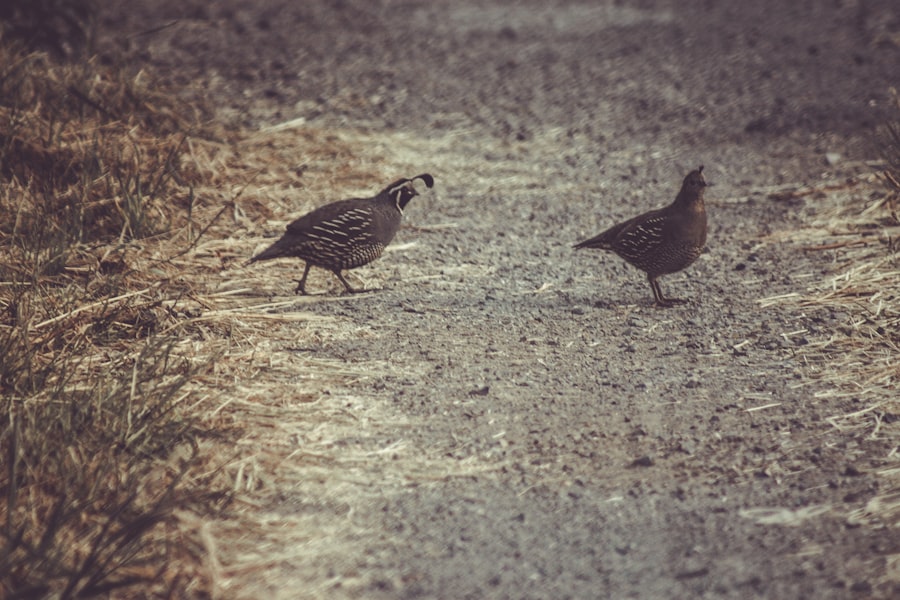
Handling and socializing with indoor quails is an important aspect of their care that can help build trust and bond with them. When handling quails, it’s important to approach them calmly and gently to avoid causing stress or injury. It’s best to handle them from a young age so they become accustomed to human interaction. When picking up a quail, it’s important to support their body with both hands to prevent injury or discomfort.
In addition to handling, socializing with indoor quails can be achieved through spending time near their enclosure, talking to them softly, and offering treats from your hand. This can help them become more comfortable with human interaction and build trust with their caretakers. It’s important to be patient when socializing with quails, as it may take time for them to become accustomed to human interaction.
By handling and socializing with indoor quails, you can build a strong bond with them and provide them with mental stimulation and enrichment.
Health and Veterinary Care for Indoor Quails
Providing proper health care and veterinary attention is essential for maintaining the well-being of indoor quails. It’s important to monitor the quails regularly for signs of illness or injury, such as changes in behavior, appetite, or appearance. If any concerns arise, it’s important to seek veterinary care from a professional who has experience with avian species.
In addition to regular monitoring, it’s important to provide preventative health care for indoor quails, such as vaccinations and parasite control. It’s also important to maintain a clean environment and provide proper nutrition to support their overall health.
By providing proper health care and veterinary attention, you can ensure that your indoor quails remain healthy and happy for years to come.
If you’re considering keeping quails indoors, you may also be interested in learning about the ideal number of chickens for a family of four. Poultry Wizard’s article on “How Many Chickens Do You Need for a Family of 4?” provides valuable insights into determining the right flock size for your household. Understanding the dynamics of poultry keeping can also be beneficial when it comes to breeding geese. For instance, knowing the incubation period for goose eggs, as discussed in another Poultry Wizard article, can help you plan and prepare for successful hatching. Additionally, creating a comfortable and functional living space for your birds is essential. Poultry Wizard’s guide on “Chicken Coop Nest Box” offers practical tips for designing a coop that meets the needs of your feathered friends. These resources can complement your knowledge and enhance your experience in raising poultry. (source)
FAQs
What are the benefits of keeping quails indoors?
Quails can be kept indoors to protect them from predators, extreme weather conditions, and to have better control over their environment. Indoor quail keeping also allows for easier monitoring and maintenance of their living conditions.
What are the key considerations for keeping quails indoors?
When keeping quails indoors, it is important to provide them with adequate space, proper ventilation, suitable bedding, and a balanced diet. Additionally, maintaining cleanliness and hygiene is crucial for their health and well-being.
What type of housing is suitable for indoor quail keeping?
Indoor quail housing can range from simple cages or hutches to more elaborate setups such as aviaries or converted sheds. The key is to provide enough space for the quails to move around comfortably and to ensure that the housing is secure and predator-proof.
What should be included in an indoor quail’s diet?
A balanced diet for indoor quails should include a combination of commercial quail feed, fresh greens, grains, and occasional treats such as mealworms or fruits. It is important to provide access to clean water at all times.
How can indoor quail housing be kept clean and odor-free?
Regular cleaning and maintenance of the indoor quail housing is essential to keep it clean and odor-free. This includes removing soiled bedding, cleaning food and water containers, and ensuring proper ventilation to prevent the buildup of ammonia from their droppings.
What are some common health issues to watch out for when keeping quails indoors?
Common health issues in indoor quails include respiratory infections, parasites, and nutritional deficiencies. It is important to monitor the quails for any signs of illness and to seek veterinary care if necessary. Regular health checks and proper hygiene practices can help prevent these issues.
Meet Walter, the feathered-friend fanatic of Florida! Nestled in the sunshine state, Walter struts through life with his feathered companions, clucking his way to happiness. With a coop that’s fancier than a five-star hotel, he’s the Don Juan of the chicken world. When he’s not teaching his hens to do the cha-cha, you’ll find him in a heated debate with his prized rooster, Sir Clucks-a-Lot. Walter’s poultry passion is no yolk; he’s the sunny-side-up guy you never knew you needed in your flock of friends!

